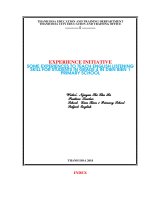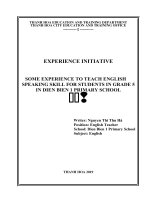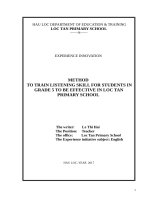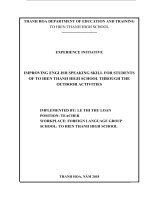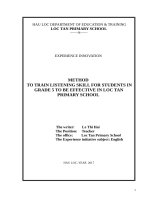Some experiences to teach english speaking skill for students in grade 5 in điện biên 1 primary school
Bạn đang xem bản rút gọn của tài liệu. Xem và tải ngay bản đầy đủ của tài liệu tại đây (2.34 MB, 21 trang )
THANH HOA EDUCATION AND TRAINING DEPARTMENT
THANH HOA CITY EDUCATION AND TRAINING OFFICE
---------- & ----------
EXPERIENCE INITIATIVE
SOME EXPERIENCE TO TEACH ENGLISH
SPEAKING SKILL FOR STUDENTS IN GRADE 5
IN DIEN BIEN 1 PRIMARY SCHOOL
&&
Writer: Nguyen Thi Thu Hà
Position: English Teacher
School: Dien Bien 1 Primary School
Subject: English
Thanh Hoa 2019
INDEX
1. INTRODUCTION
PAGE
1.1. The reasons for choosing the topic
1
1.2. The purpose of research.
2
1.3. The objects of research.
2
1.4. The method of research.
3
2. CONTENT
4
2.1. Theoretical basis of the experience initiative.
4
2.2 . Situation issues before applying experience initiative.
4
2.3. The solutions of implementation.
6
2.4. The effect of the experience initiative.
14
3. CONCLUSIONS AND SUGGESTIONS
16
3.1. Conclusion
16
3.2. Suggestions
16
1. INTRODUCTION
1.1 The reason for choosing the topic
Nowadays the trend of international integration in many areas including
the field of education has brought English up a very important position. English
as a means of communication is the key to the treasure of humanity. On the
other hand, the wide application of information technology has made learning
English become urgent and indispensable. So learning English of Elementary
School students is particularly concerned by students, parents, all the teachers of
education in our country. English has become one of the main subjects in the
curriculum of students.
Learning and using of English require a diligent process of creative
practice of both learners and teachers. Especially in the situation of education
reform as currently, teaching English in view of communcation methods is
widely supported. According to this method, students have many opportunities
to communicate, to practise language and to participate in practical situations:
Learning coupled with practising.
Primary level English program has been implemented in all regions across
the country. Innovation prominent feature of the content of this program is to
privide maximum opportunities for students to practise four skills of listening,
speaking, reading and writing on the topics and situations, communication
contents related to environments living at home and abroad. The change in
facilitating the teaching and learning of English in secondary schools becomes
teaching living language instead of teaching words as many years ago. However,
in practical English skills forged for students, teachers confronted with many
difficulties, especially listening skill forged. Through my school in the city area,
when students started to learn foreign languages, most of them were very
interested in English, but eventually they fell tired of it. Most of them are very
bad at speaking skill. It’s difficult for them to understand the content of an essay
or dialogue they hear.
1
In my opinion, the purpose of learning English is to communicate it with
the speakers. Speaking is the most difficult skill of all, especially for students
living in the countryside or in the remote region. Through the years of teaching
English in elementary school, I found that English communication skills of the
students are still limited. To overcome this situation, I have researched some
experiences to improve the speaking skill of primary students. The primary
environment is the fundamental place forming habits and communication
capacities. Frequent communication results in braveries for students without
fears of making mistakes in public speaking. As for students lacking proficiency
in the mother tongue language, they had a lot of difficulties in getting access to a
foreign language. Their timidity makes oral communication limited greatly.This
is why I choose the theme of experience initiative: “Some experience to teach
English speaking skill for students in grade 5 in Dien Bien 1 Primary
School”. I hope I will get more and more my colleague’s ideas which I can
complete my knowledge and my subject. It can help my students improve the
communication.
1.2 The purpose of research
I am an English teacher in a primary school. I constantly research, activity
innovate teaching methods to improve the quality of teaching and learning. I
wrote this topic to share small experience with my colleagues to help students
grade 5 of Dien Bien 1 Primary school improve the knowlegle and quality of
English in communication.
- Find out the current status of teaching speaking skills.
- Build the basic of teaching English and the methods to help students
communicate.
- Evaluate empirical results and draw up useful pedagogical lessons.
1.3 The objects of research
- Some experiences to teach English speakinging skill for students in
grade 5 in Dien Bien 1 Primary School.
- Students of class 5D, 5E at Dien Bien 1 Primary school.
2
1.4 The methods of research
With this topic I have applied the following methodology:
- Observe students .
- Interview students.
- Check and compare learning outcomes of students.
- Study the textbook program, instruction manuals.
- Discuss with experienced colleagues in professional meetings.
3
2. CONTENT EXPERIENCE INITIATIVE
2.1. Theoretical basis of the experience initiative
Speaking skill is one of four key skills in teaching English to students
with the ability to communicate quickly and practice to achieve the highest
efficiency.
Elementary students, who have just entered the first grade, find it very
difficult to learn how to speak and write Vietnamese well. They face many
difficulties at school and most of them are weak at four skills listening,
speaking, reading and writing. Especially they are afraid of speaking English at
school due to many different causes such as being psychocogical shy, cautious,
afraid of being laughed at when they are wrong. There are too many students in
the class, teachers do not have enough time to help students develop their
speaking skills for each student. It is said good training will help to overcome
the limitations on less.
Developing speaking skill helps students with more practice conditions in
the class, a foreign language class. It is necessary to review old and then
introduce new lesson. All new knowledge is suggested gradually from the basic
knowledge they have learned in the previous lessons. Therefore, students aren’t
afraid of making new posts.
Through practicing speaking, teachers help students acquire knowledge in
an active way, overcome the inhibition of only certain classes of gifted students
participate in speech, so it will attract all students in participating classes’s
activities including moderate or week children.
Enhencing the ability of students to behave in different situations, so
students are interested and boldly confident when they practice communicating
in English. School will become fun, funky and highly efficient.
2.2 . Situation issues before applying experience initiative
a. Advantages:
- Dien Bien 1 Primary School is located in the center of the city.
The school has a teaching staff who are young, fit, enthusiastic, capable of
4
teaching and always love their job. Qualifications and standards are 100%. In
the field of education, my school is always interested, focused on teaching and
learning, always enables teachers and students to fulfill the duties and assigned
targets. And the school has always received the active support of the local
government for many years, the school was rewarded as the advanced school in
the city.
- Administrators of our primary school always care about and create
favorable facilitities and profestional documents serving as teaching subjects:
projectors, TV.
- Most students prepare books and supplies for learning English
b. Disadvantages:
- Although our primary school is located in the center of the city, the
situations of the students face many difficulties. There is not enough investment
in English in time. Students also are not familiar with the method of learning in
English listening skill as well as how to learn really effectively.Beside that, the
total number of classes and students are overcrowded.
- To the parents, they are also difficult to check or guide children to learn
a foreign language at home by subjects, which parents do not know. They have
limitedly accessed to communicate in English outside school hours.
In addition, English is a difficult subject, the knowledge is difficult but
takes less study time, and in the listening process they do not control what they
will be listened. Words in tape are too fast, not familiar. A lot of new words,
word stress, sentence stress, intonation are very different and difficult for
students to understand the content. The questions is how we overcome these
weaknesses in order to contribute to improve the learning quality of speaking
skill, help students communicate more confidently in using English as a second
language, be proficient in words, sentences, especially for students in as grade 5
students in Dien Bien 1 Primary School.
In order to solve this problem, the first semester of school year
2019, I had a small survey with two classes of grade 5 as follows:
5
2018 -
Result:
Class
Total
5D
5E
Sum
38
39
78
Well- done (%)
Completed (%)
Total
17
18
35
Total
18
19
37
%
44,74%
46,15%
44,87%
%
47,37%
48,72%
47,44%
Uncompleted (%)
Total
3
2
5
%
7,89%
5,13%
6,41%
With this result we can see the results of students in inadequate. The
number of good students is low, while that one of weak students is high. So this
fact requires teachers to find remedies, to help them improve their learning
outcomes.
3. The solutions of implementation
Introduce the purpose of practice speaking English skill. There are many
ways to practice speaking English such as: Speaking in individually, in pairs or
in groups. If students practice in pairs or in groups, teachers have to divide into
pairs, speak in group prior to his students to practice with each other. Teachers
also have the discipline required to practice.
Practice speaking has to be systematic, ongoing and trould be followed
the guideline from easy to difficult.
Depending on the situations teachers should prepare the appropriate form
of exercise for many pupils to practice speaking in each part of the lessons such
as.
Speaking of freedom: Teachers creat contexts, themes for students to
practice speaking in pairs or groups. In this section teachers can use pictures,
photos in and out of textbook or close topics to them and teachers should ask
students to speak in real situations.
Speaking is creating opportunities for students to communicate closely to
real life. Teachers should encourage students to follow the guiderline test, accept
mistakes. They should not make pressure, they will bring severe fear of making
mistakes.
6
Teachers should make maximum use of classroom time, creating
opportunities for students to be able to use the learning means efficiently.
Select a theme to develop, consistent with psychology, age and nature of
such period of daily life, or the people on movie watched on television, on the
favorite sport or someone they really, really love.
Teachers can question the nature of evil to students argue for exciting part.
Some solutions to develop speaking skill.
Solution 1: Impvoving the sudents’ awareness about learning how to
communicate in English.
Propaganda is the first method chosen to raise awareness for students.
As you know, some primary students don’t pay more attention to learn and
communicate English because it is only a optional subject in primary schools. It
is also a difficult subject at school. Therefore I always persuade my students
about the importance of communicate English. If the students speak English
well, they can communicate English with the speakers, they can travel over the
world, they can be easy to make friends with the foreigners, they can chat with
the foreigners on facebook or zalo, they can be easy to find a good job or read
newspapers, stories or watch films in English. Thank to my persuasion, my
students can understand why they should communicate in English. When they
understand the important role of speaking, they will be hard- working to take
part in communicating English effectively.
Solution 2:Teacher should communicate in English much more than in
Vietnamese in the classroom language classroom.
To help students speak English well, teacher should encourage students to
use English as much as possible. Classes should provide opportunities for
students to communicate in a variety of forms: Teacher - Whole class, TeacherStudent, Student-Student. The teacher is the person who guides the children to
make simple situations and subject – based conversations.
Beginning of lesson:
- Good morning. How are you?
7
- Did you have a nice weekend?
- Have you done your homework?
- Let’s play a game now, shall we?
- Are you ready?
Ask for repetition:
- Would you mind repeating......?
- Could you say it again?
- Pardon?
During English lessons, Teacher should speak English much more than
Vietnamese and use a mixture of the two languages.
English
Introducing the lesson
Checking attendance
Organizing
Classroom control/ discipline
Giving praise
Presenting new language
Introducing a new text
Asking questions on the text
Correcting errors
Setting homework
Vietnamese
Both
v
v
v
v
v
v
v
v
v
v
Solution 3: Impvoving communication through using pictures
Nowadays, modern teaching methodology encourages the use of as many
media, especially pictures as possible in classroom. At the same time, the
innovation in English teaching at general education level demands that the
schools should provide students with a good communicative skill in English.
However, nowadays teaching English speaking at many primary schools as well
as the using of pictures in English speaking classrooms to motivate learners
haven’t been paid attention to. Therefore, this aims at researching the use of
pictures in English speaking classes at primary schools and put forward some
practical suggestions to improve the quality of English speaking teaching and
learning. I usually use the pictures to help my students practice communicating
8
in all of the lessons. My students are very practical when I use the pictures, my
students can be easy to talk and understand.
Unit 16: Where’s the post office?- Lesson 1- Part 5
To revise the structure: Excuse me, Where’s the .....? Ask students look at
the picture, ask and answer questions about directions.
Example :
S1: Where’s the cinema?
S2: It’s between the theatre and the supermarket.
S1:Where’s the theatre?
S2: It’s opposite the stadium.
S1: Where’s the stadium?
S2: The stadium is on the corner of the street.
I always try to use the pictures to teach my students how to communicate
in the part “pre and post” for reading, listening and writing skills. This helps my
students speak English everywhere and everytime.
This is a closed and educational topic for students to learn because it helps
them know how to take care of their family members and their friends when
they have health problems.
9
Unit 11: What’s the matter with you?- Lesson 1- Part 2
Teacher give model dialogues
A: What’s the matter with you?
B: I have a toothache.
A: You shouldn’t eat too much candy.
B: Ok. I won’t , thanks.
A: What’s the matter with you?
B: I have an earache.
A: You should go to the doctor.
B: Yes, I will, thanks.
Give some pictures of activities then ask students to talk about where
they will go and what they will do this weekend. Then ask students to retell their
partners’ trip
Unit 11: Where will you be this weekend?- Lesson 2- Part 2
Example:
A: Where will you be this weekend?
B: I think I will visit HaLong Bay.
A: How will you get there?.
B: I will get there by car.
A: Who will you go with?
B: I will go with my family.
A: What will you do?
10
B: I don’t know. I may explore the caves, swim in the see and build sandcastles.
Postcards:
This weekend A will visit Hlong Bay. He/ She will go with his family.
They will get there by coach. They may explore the caves play football and
build sand castles. They will eat sea food and buy some postcards for their
friends.
Have students interview their partner about what his or her family
members do in their freetime. Then retell the information in front of the class.
Unit 13: What do you do in your freetime?- Lesson 2- Part 3
Example:
A: What do you do in your freetime?
B: I often read books.
A: What does your father in his freetime?.
B: I go fishing.
A: What does your mother in her freetime?.
B: I go swimming.
A: What does your younger brother in his freetime?.
B: I go skating.
A: How often does he go skating in his freetime?.
B: Once a week.
Retell: His/ Her father goes fishing twice a week in his freetime and his/ her
mother goes swimming once a week.... .
Solution 4: Impvoving communication through working in pair and groups
With this method, it is necessary for students to develop their ability to
learn in a positive, active and creative way. They have to show themselves, find
11
out and conquer the self. And in my opinion, through group work in some
activities, when students have learned how to work in groups, they have the
conditions to cooperate, learn from each other and take responsibility. Give
responsibilities for special group members who self-dominate knowledge if the
teacher organizes and guides well. Team teaching is an active method in which,
the number of students is divided into groups in certain ways. In each group,
students have chances to boot listening and speaking skill and learn from one
another. They will be more confident in communicating in a foreign language.
Solution 5: Impvoving communication through games.
Besides I carry out teaching methods that promote the activeness and
creativity of today, I do it regularly and effectively, I often apply some learning
games during lessons to redude cramming and to make the lesson more
interesting, to help students active.
Learning games are a special kind of game, not only help the students to
entertain, but also to help them acquire knowledge through the game or
reinforce what they have learned. A new teaching method could create an
amount of inspiration and creativities for teachers. Each teacher has his own
unique creativities during teaching process. If teachers repeat the same method
in every lesson, students will get bored and even feel that lessons come as
normally without inspiration and expectation. Games are also considered to be
an important entertainment form. In fact, they could be used to consolidate
material languages as shown above by the method of attracting students. In all
every form, games could perform functions of exercises of practicing skill
because we can review and introduce material languages in funny and wellorganized ways through games. The method takes effects when students learn
new words and sentence structures. On the contrary, games are often open-ended
and student- centered. There are various types of games. Several ones focus on
vocabularies or sentence structures. And there are games promoting both
vocabularies and sentence structure. Here are several games that I usually apply
to my lecture in my class:
12
+ Lucky number:
Students select the 1-9 number they like. If they choose the lucky number,
they don’t have to answer the question but get points (2 points for one). If it
isnot the lucky box, the team must answer correctly to score points. If the team
chooses not to answer, the chances of scoring for the opposing team (If both
teams do not have the right answer, the chance will be for the audience). The
winner is the team with more points. (If two teams score the same points, the
winner will be the one with more lucky numbers). The sequence numbers of the
crossword correspond to the question the teacher has prepared according to the
content of the unit.
+ The flower bloom:
Forging the speaking skills are structured into some simple sentence
patterns learned. An ornamental bonesai with coloured paper flowers in which
questions are written in English. For example:What would you like to be in the
future?......
Let the children play in the classroom, in turn to pick up flowers. Flower
pickers, then read the question of flowers for the class to hear and answer
questions in front of the class. Those who answer correctly are rewarded and
given a reward. Bring back the correct and fast answers. Teachers comment on
the mistakes students make.
Solution 6: Impvoving communication through songs and chants
As you know, the students want to learn English well, the first thing we
have to do for children to love it. Music is the communication that will help
them get closer to this subject. When they sing or read chants, they will fell
more comfortable. They are easy to remember the structures.
*Perform :
In addition to the songs and the chants on the program, I also collect some
internet games, tapes of children’s ages to teach them. Primary students are very
13
active and enjoy singing, fun songs and the chants that make them interested.
Through this, students will study English more. Teachers needs to explain the
meaning and content of the song so students understand, appreciate the song.
Since then, they are more interested in singing better. Students sing in groups
and groups and can let them choose their own songs. When teaching new songs,
I integrate into the class assignments to both reduce stress and provide more
songs for students. This also helps students remember structure sentence
quickly.
Example:To revise how to ask and answer questions about common health
problems, I use this song.
To revise how ask and answer questions about how someone learns
English. I use this chant.
How do you learn English?
14
Unit 7: How do you learn English? - Lesson 3- Part 3
4.The effect of the experienced initiative
The survey was made after Unit 17 of the second semester, grade- 5
school year 2018 - 2019 (about seven months I taught English speaking skill in
my teaching)
Result:
Well- done (%)
Completed (%)
Uncompleted (%)
Total
%
Total
%
Total
%
38
22
57,89%
16
42,11%
0
0
5E
39
24
61,54%
15
47,83%
0
0
Sum
78
46
58,97%
31
41,03
%
0
0
Class
Total
5D
Basing on the above result, it is clear to see the better result of the present
survey comparision with the result of the past survey:
Well- done quality increases from 44,87% to 58,97%.
Complete quality reduces from 47,44% to 41,03%.
Incomplete quality reduces from 6,41% to 0%.
Most of students have finished well in speaking tests periodically.
Experiential lesson:
Teachers need to discover a fundamental deficiency of students in order to
have overcome:
15
- Teacher need to choose a suitable skill for each student. Help students have
the best conditions to learn the subject, especially practice speaking skills.
- During the lesson, the teacher should take advantage of time to guide
students to practice speaking.
- Need to know disadvantages in teaching time, class size, teaching aids and
material factors such as class sizes, teaching aids.
- Teachers should encourage pupils to use English as much as possible.
3. CONCLUSION AND SUGGESTIONS
1. Conclusion
Learning is long hard work for students. Thus teacher not only has finds
ways to make lessons more effective but also attracts the students’ attention.
Guiding for children to have good learning methods is very important,
especially, it is necessary to encourage them to use English in daily life. If we
learn a forein language but we do not pracice communicating daily, our
knowledge will be faded time by time. So I have made some slight ideas to help
myself find a method of teaching a speaking more effectively, help students to
achieve high quality learning. In my opinion, training speaking skill for primary
students is a positive approach, optimal and efficient for students because this
method has been verified through actual teaching and members of professional
groups who have analysed, evaluated and consented.
2. Suggestions
In the era of development, it is the young generation who are the pioncers
to connect Vietnam with international friends, so they are the ones who need to
learn more, devote their best ability to a rich and flourish country, and help their
country to be equal with the great powerful countries in the world. And so, the
way to lead them to success is to learn, to hear, to speak, and to communicate in
English very well. With that importance, I strongly suggest as follows:
a.For young learners:
16
We give them some playgrounds, clubs to speak English at school. By
coordinating with English professional groups, other professional groups as well
as and other organizations, weekly or monthly and specialy anniversary holidays
of the year, we must have real plan and encourage weaker students to
participate.
2. For teachers:
In addition to teaching in the classroom, teachers need to visit class,
supervise colleagues not only in schools but also take time to visit colleagues in
school groups. Regularly organize their teaching subjects in accordance with the
actual situation of the school and classroom. It has to be evaluated, contributed
ideas and given honest and accurate comment often each lesson.
Sincerely thank you!
Certified by the principal
Dien Bien1, March 30th, 2019
I declare that this is my experience
initiative. I do not copy the other
person's content .
Written by
Phạm Thị Mai Hoa
Nguyễn Thị Thu Hà
17
REFERENCE
1. Vietnamese Educational Publisher – Tiếng Anh 5 (2009). Ministry of
Education of Training.
2. Listeners Strategies in Collaborative Discourse of AAU 5 th Year
Students Unpublished M.A. Thesis.
3. Cambridge University Press. Rixon, S. (1986). Developing Speaking
skills.
4. Cambridge University Press. Yagang, F. (1993). Speaking: Problems
and Solutions. In Thomas Kral(ed).
5. Rost, M. (1990). Speaking in Language Learning.
6. Ur, Penny. 1984. Teaching Speaking Comprehension. Cambridge
University Press.
7. English Student’s book- Grade 5- Viet Nam Educational Publisher.
18
DANH MỤC
SÁNG KIẾN KINH NGHIỆM ĐÃ ĐƯỢC HỘI ĐỒNG SÁNG KIẾN KINH
NGHIỆM NGÀNH GIÁO DỤC & ĐÀO TẠO THÀNH PHỐ, TỈNH VÀ
CÁC CẤP CAO HƠN XẾP LOẠI TỪ C TRỞ LÊN.
Họ và tên: Nguyễn Thị Thu Hà
Chức vụ & đơn vị công tác: Trường TH Điện Biên 1- TP Thanh Hoá.
TT
1
2
3
4
5
Tên đề tài SKKN
Cấp đánh
giá xếp loại
(Phòng, Sở,
Tỉnh…)
Kết quả
đánh giá
xếp loại
(A, B,
hoặc C)
Năm học
đánh giá
xếp loại.
Tỉnh
C
2006 - 2007
Tỉnh
B
2009 - 2010
Tỉnh
B
2011 - 2012
Tỉnh
B
2013 – 2014
Tỉnh
B
2015 – 2016
Một vài kinh nghiệm giảng dạy
ngữ âm bằng phương pháp thực
hành giao tiếp.
Gây hứng thú và củng cố kiến
thức trong giờ học bằng các bài
hát tiếng anh lớp 3.
Một vài kinh nghiệm giúp học
sinh thích học chương trình
tiếng anh lớp 5.
Một vài thủ thuật giúp học sinh
lớp 4 ghi nhớ từ vựng .
Using simple songs to inspire
and consolidate knowledge in
English lessons for students
grade 4.
19


